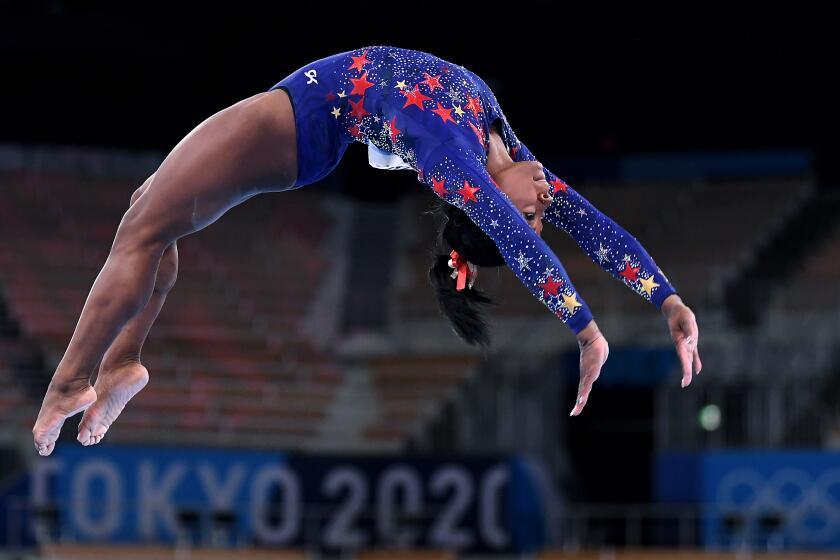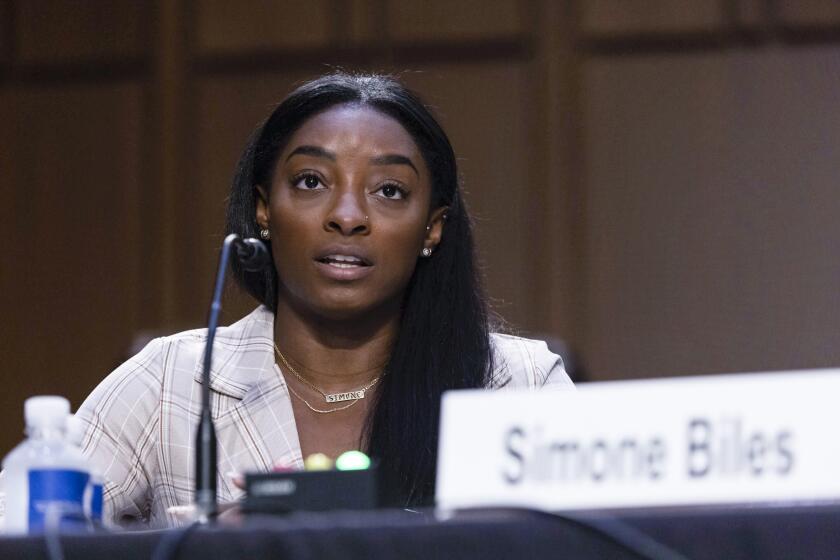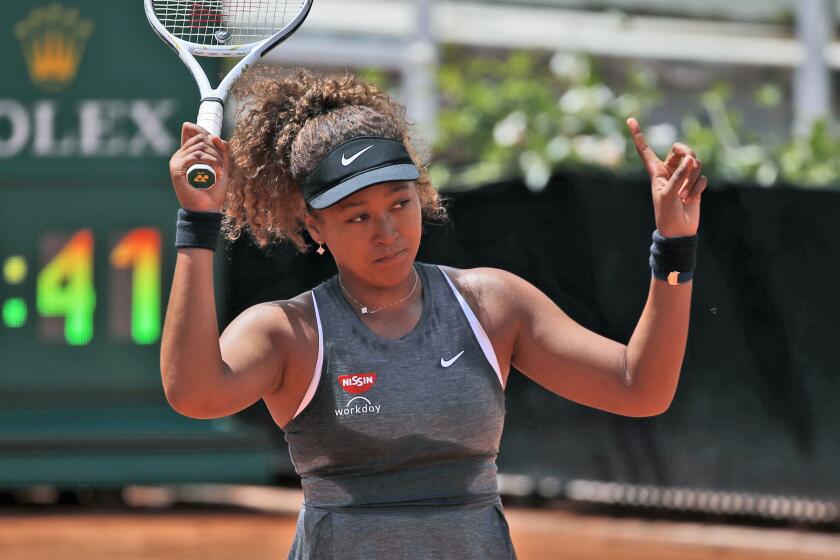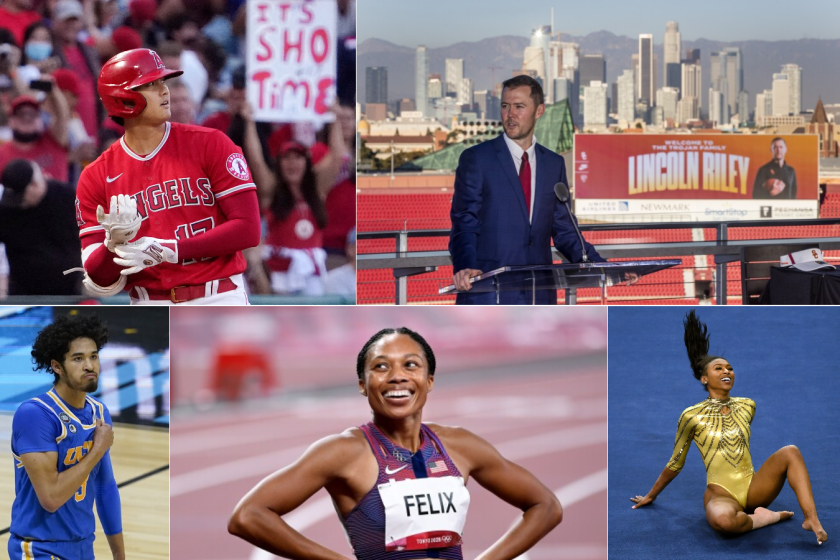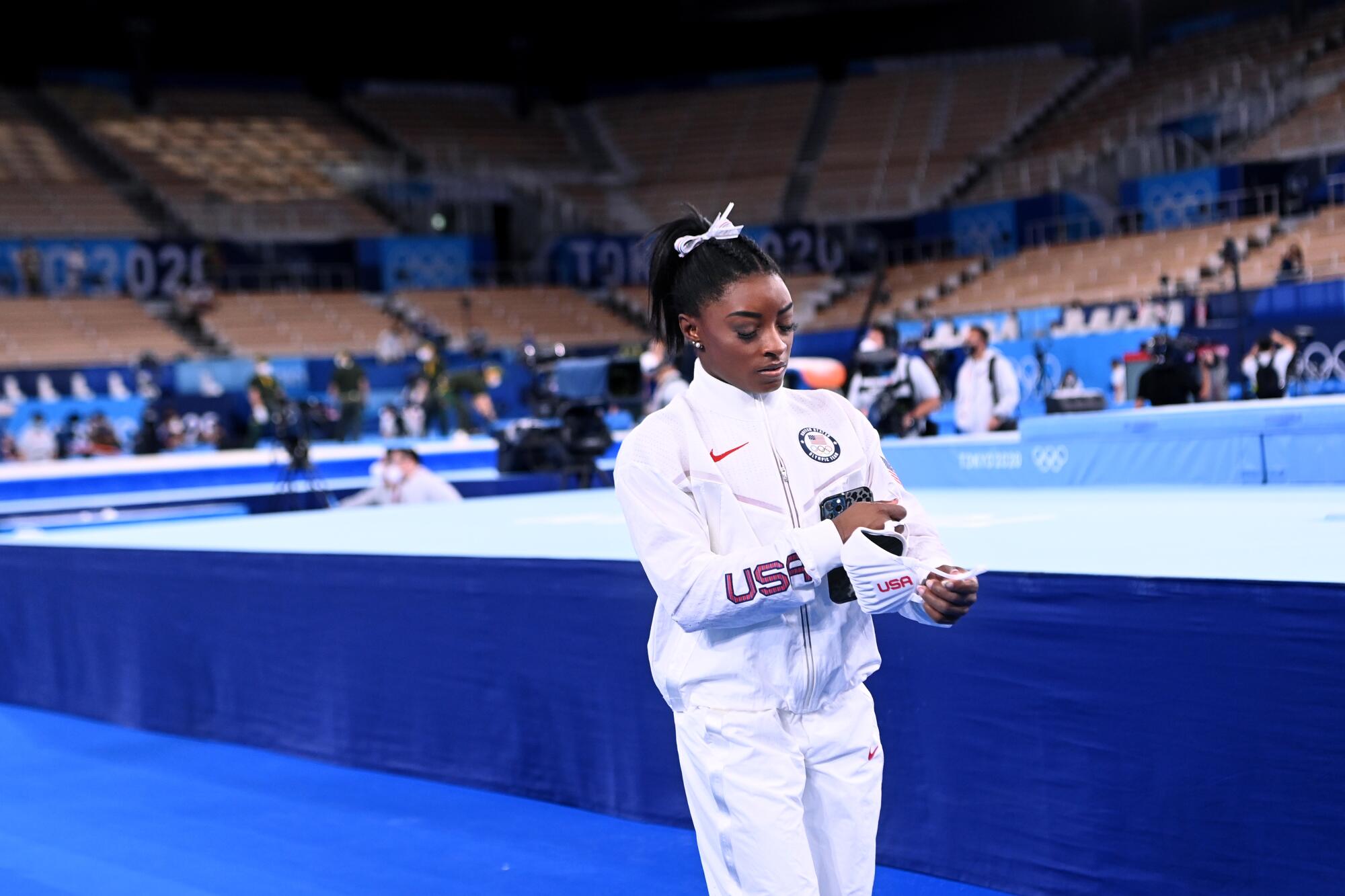
- Share via
A shockwave sliced through the Ariake Gymnastics Center early in the women’s team competition at the Tokyo Olympics.
Simone Biles, who was favored to equal or top the five gymnastics medals she won at the 2016 Rio Games, had barely stayed upright while landing a vault she should have done with the confident flair that earned her the nickname GOAT — greatest of all time. She did 1½ twists of a planned 2½-twist vault, leaning to her right as she landed and taking a big step forward. Only her instincts spared her a dangerous fall. Fans hadn’t been allowed into the arena but the competitors, coaches, officials and media representatives who were there gasped in collective surprise and concern when she nearly toppled over.
Was she injured or just unusually jittery? The buzz grew after she consulted a U.S. team trainer and left the competition floor. She returned from the locker room wearing a warmup suit and sat out the rest of the team event because of what USA Gymnastics called a medical issue.
A majority of Black Americans believe having a mental health condition is a sign of weakness. Biles and other athletes are changing the narrative.
Biles’ acknowledgement later that she had withdrawn because of mental health problems ensured that 2021 will be remembered as the year it became OK for even the toughest athletes to say they weren’t OK mentally.
Her performance two days earlier in the qualifying phase of the competition had offered hints something wasn’t right. She wasn’t her usual stellar self that day, but there seemed little reason to worry. Her stumble off the mat during her floor exercise routine and the three big steps she took on her dismount from the balance beam could have been explained as products of the remarkable power that distinguishes her breathtaking moves. It made sense for her not to attempt another historic Yurchenko double-pike vault — which no other woman has landed in competition — because she didn’t need to take risks in the qualifying round. She didn’t nail her first vault but recovered well on her second vault.
Later, she disclosed the extent of her stress in an Instagram post, saying she sometimes felt she had the weight of the world on her shoulders. That was understandable. She had become the face of the Tokyo Games, but her brilliant smiles hid her distress. Delaying the Olympics a year because of COVID had taxed her body, and she was still working through the emotional trauma of having been sexually abused by USA Gymnastics’ former team doctor. That was a lot to bear. During the team event, she couldn’t bear it any longer.
After her stunned teammates united to win a silver medal, Biles said she’d begun shaking uncontrollably following a workout that morning. She also had what gymnasts call “the twisties,” a loss of orientation in the air. Continuing to perform her singularly difficult routines would have been hazardous. “I was like, ‘No, mental’s not there,’” she said.
From the Capitol riot to vaccines and climate change, a look at what dominated the news and conversation in 2021 as the world began to move past the pandemic.
In subsequent days she withdrew from the all-around, floor exercise, vault and uneven bars events but returned to win a bronze medal on the balance beam. “I just physically and mentally was not in the right head space and I didn’t want to jeopardize my health and my safety, because at the end of the day it’s not worth it,” she said.
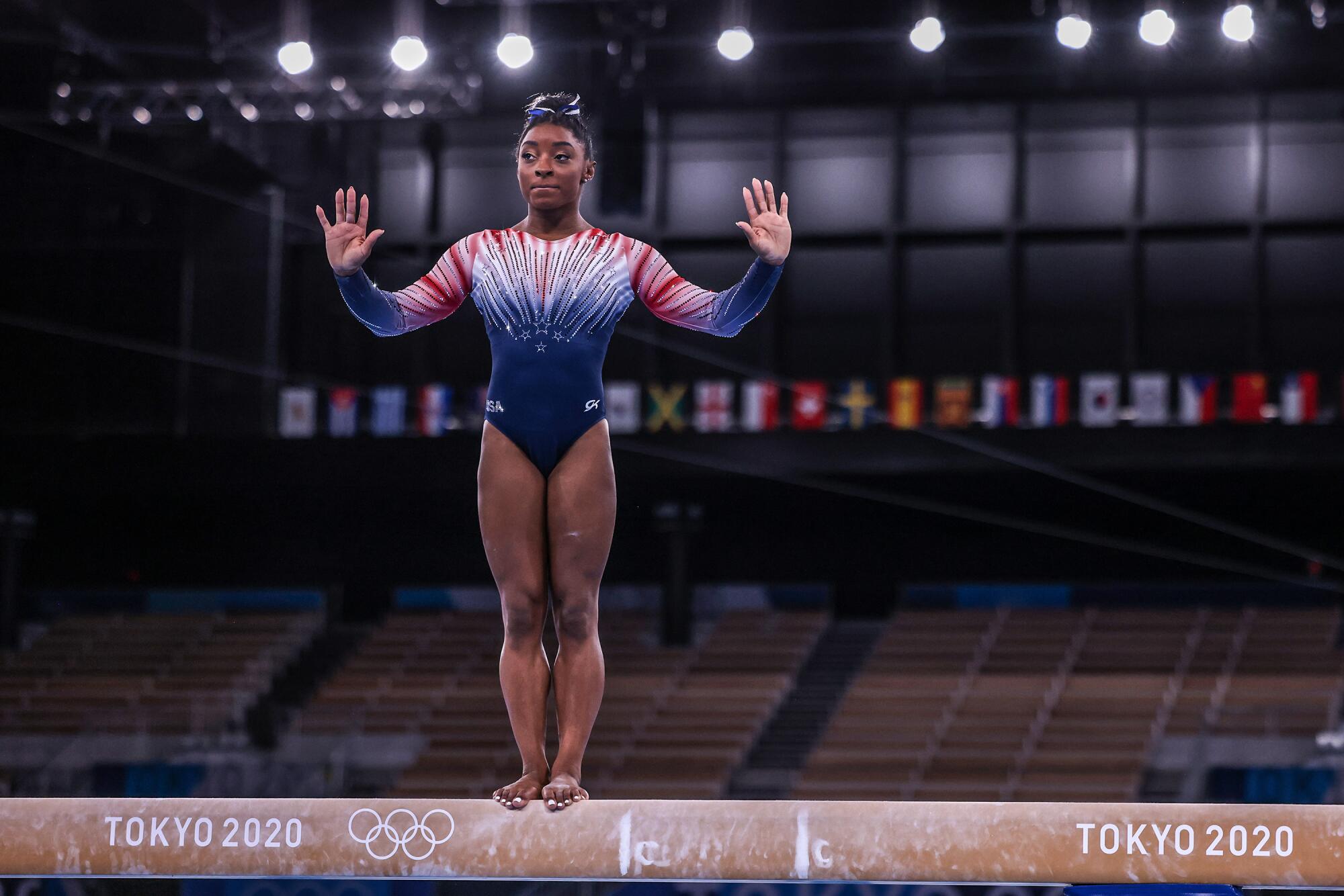
Despite losing a chance to win five or six medals, Biles achieved a significant triumph: She pushed mental health issues to the forefront of conversations in sports and beyond, encouraging discussion of a topic that had needlessly been cloaked in isolation, fear and shame.
Her description of her problems echoed those of four-time Grand Slam tennis champion Naomi Osaka, who cited depression and anxiety when she pulled out of the French Open in June. Osaka also skipped Wimbledon. She was unusually emotional during her third-round loss to Leylah Fernandez at the U.S. Open in September, alternately slamming and throwing her racket and whacking a ball into the stands in anger.
“For me recently, when I win, I don’t feel happy. I feel more like a relief,” Osaka said that day. “And then when I lose, I feel very sad. I don’t think that’s normal ... I feel like I’m at this point where I’m trying to figure out what I want to do, and I honestly don’t know when I’m going to play my next tennis match.”
She hasn’t played since then. In early November she posted a photo of herself on a practice court with the caption, “Kinda rusty, but feels good to be back.”
Biles and Osaka weren’t the only athletes whose mental health issues drew widespread attention this year.
Olympic star Simone Biles’ life has been marked by profound challenges. She wants to pass on positive mental health lessons during the Gold Over America Tour coming to Southern California.
Philadelphia Eagles all-pro tackle Lane Johnson missed three games in October due to withdrawal symptoms he experienced when he stopped taking medication prescribed for his anxiety. “Football wasn’t even a question at the time,” he said at a news conference. He also said he was buoyed by the support he received after going public with his problems. “It’s a lot more common than you think,” he said.
Atlanta Falcons wide receiver Calvin Ridley stepped away from football twice this season to focus on his mental well-being and isn’t expected to return. Last month four-time Pro Bowl defensive end Everson Griffen of the Minnesota Vikings was seen holding a gun in social media posts and refused to leave his home. Mental health professionals and law enforcement officials persuaded him to go peacefully, and he was transported to a mental health treatment facility. He’s on the Vikings’ reserve/non-football illness list.
The story of Mark Pavelich, a member of the U.S. Olympic hockey team that stunned the Soviets and won the gold medal at Lake Placid in 1980, came to a tragic end this year. Pavelich, who had been declared mentally ill and dangerous by a judge in 2019 after repeatedly striking a friend with a metal pole, took his own life in March while undergoing treatment at a facility in Minnesota.
“Mental health needs to be normalized, the discrimination and negativity removed,” said former NHL defenseman Barry Beck, Pavelich’s New York Rangers teammate and co-founder of The Ranch, a nonprofit that aids former athletes and military veterans who have mental health issues. “There should be centers where people can get the help they need and not live in silence.”
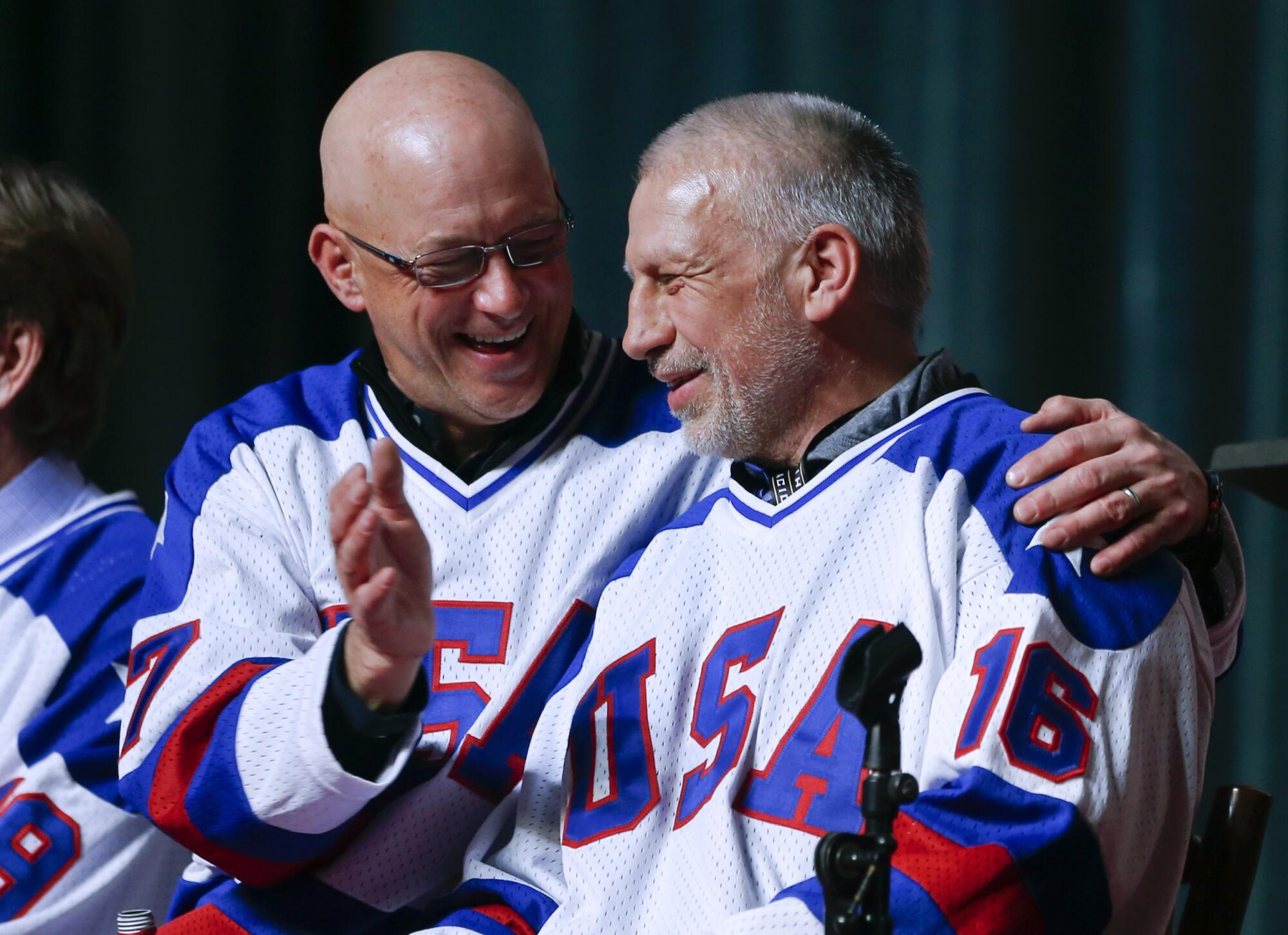
Athletes for Hope, a nonprofit that helps link athletes with community and charitable causes, started a program in May called Whole Being Athlete to promote discussion of mental health issues and provide education, training and advocacy opportunities for athletes. Suzanne Potts, who oversees the program, said Osaka’s withdrawal from the French Open was a catalyst in opening discussion on all facets of mental health issues.
“I thought it was a remarkable opportunity for her to step into the space as an advocate, to be honest, and I was really impressed that she took time to take care of herself above her sport. That’s hard to do at that level,” Potts said by phone from Austin, Texas, where she teaches at the University of Texas graduate school of social work. “I think that made it easier for other people to do the same and increased the opportunity for others at all levels to talk about their mental health issues and explore how they can get support.”
Potts became emotional while watching Biles. “My heart broke for her. One, just getting to that level of competition and knowing the effort she has put in, especially during the pandemic year, to compete. And then to step away because her mental health was impacted,” Potts said.
“What we know about athletes is your mental health and your physical health are closely connected. I thought it was really powerful for her, especially as a woman of color, to talk about the need to step away from her sport and the stress that they’re under. Athletes are under a tremendous stress to win and intense pressure to be the best, both physically and mentally, and so she was able to say, ‘Hey, I’m not at my best and I need a break.’”
Naomi Osaka revealing her struggles with depression and anxiety shows why her decision to withdraw from the French Open deserves understanding.
Robin Scholefield, director of culture, wellbeing and sport psychology for USC Athletics and a professor of psychiatry at KECK School of Medicine, works primarily with college athletes. However, she said she has seen a number of professional athletes come forward the past two or three years and contribute toward creating a positive perception of choosing to seek mental health help. She emphasized she was speaking generally and not addressing the experiences of Biles or Osaka.
“The reason we talk about stigma in athletics so much is because it’s even more pronounced based on athletic culture, which is antithetical to seeking mental health help,” Scholefield said. “What is the quintessential thing that athletes say? ‘Where there’s a will, there’s a way.’ So if you’re depressed, you just will yourself out of it or something’s wrong with you really, right?
“It just becomes a little bit more poignant because elite athletes are poster people for trying hard. They’re better at trying hard than anybody. They are not fatalists. They believe if they try hard and dedicate themselves and commit themselves they can overcome almost anything/ … It’s that piece of athletic culture that has run sort of counterintuitive to seeking mental health help.”
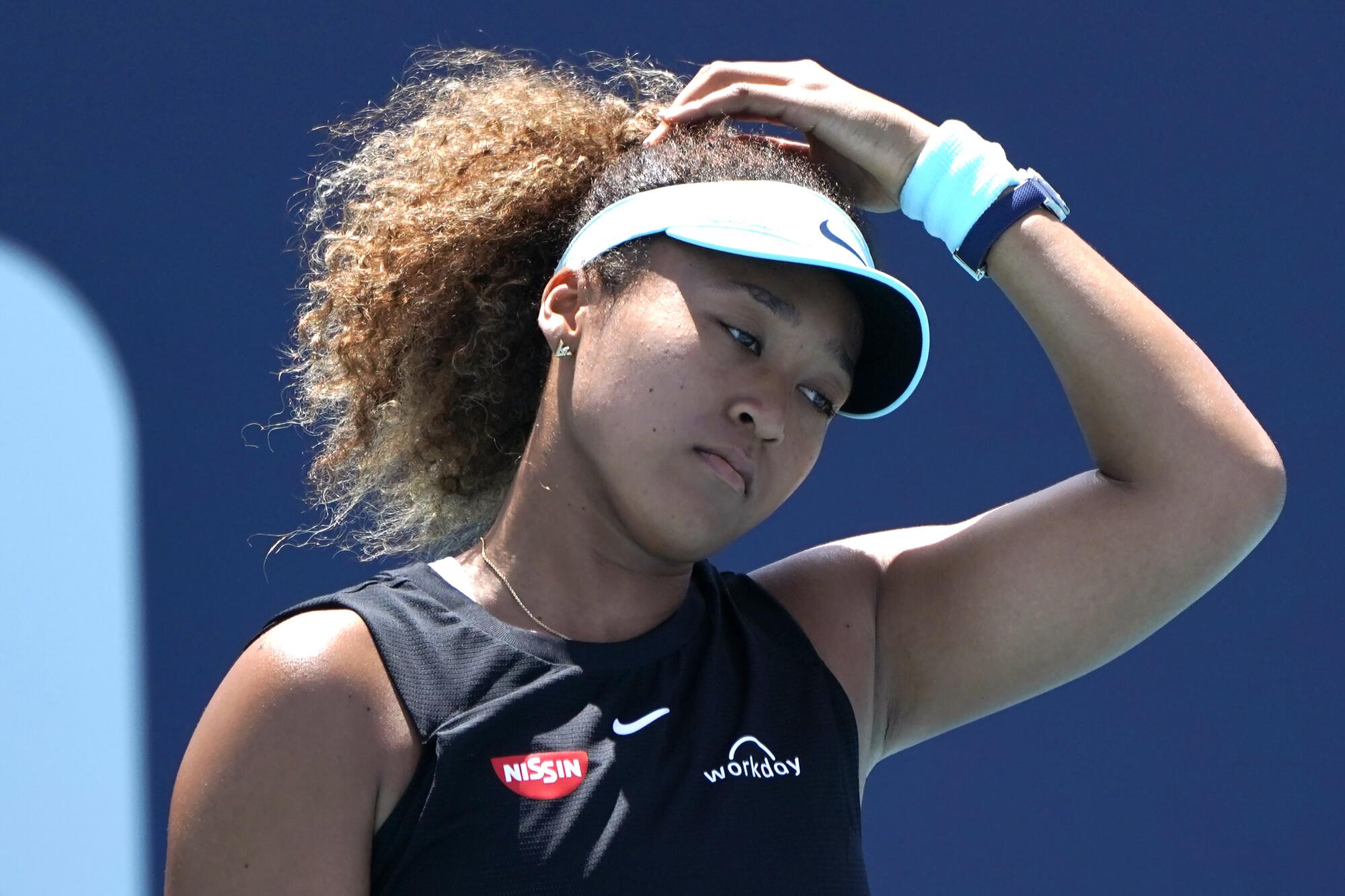
That tide appears to be turning. “Maybe over the past five years people are more educated on it,” Johnson said of mental health issues.
The athletes who came forward this year have added to the understanding of the mind-body connection and why it’s OK to say you’re not OK. “As much as the old stigma was, ‘That’s for the weak,’ it’s actually for the strong,” Scholefield said. “It’s for people who are willing to go, ‘I need help.’ Inner strength isn’t cultivated by pretending you’re not affected. You’re affected by life whether you pay attention or not. Inner strength is cultivated by saying, ‘Yes, I’m affected and I’m going to figure out how to manage this and I’m going to keep going,’ and that’s what athletes do. Because probably 80 or 90% of athletes who are struggling with mental health issues are still practicing and competing.”
Potts said she hopes athletes’ willingness to speak about their mental health issues will lead to widespread education about those issues and will inspire teams, leagues and corporations to provide extensive help and resources.
“I hope that more athletes will feel safe enough to step away or speak out about their mental health challenges just as they would if they injured their shoulder, just as they would if they hurt their ankle,” Potts said. “I also hope it won’t become a huge news story if people step away for whatever reason. It won’t become a highlight or a news story. It will just be normalized.”
Sports year in review: UCLA returns to Final Four; Dodgers thrive despite Trevor Bauer fiasco; Lincoln Riley era begins at USC; Crypto.com Arena becomes a thing.
More to Read
Go beyond the scoreboard
Get the latest on L.A.'s teams in the daily Sports Report newsletter.
You may occasionally receive promotional content from the Los Angeles Times.

